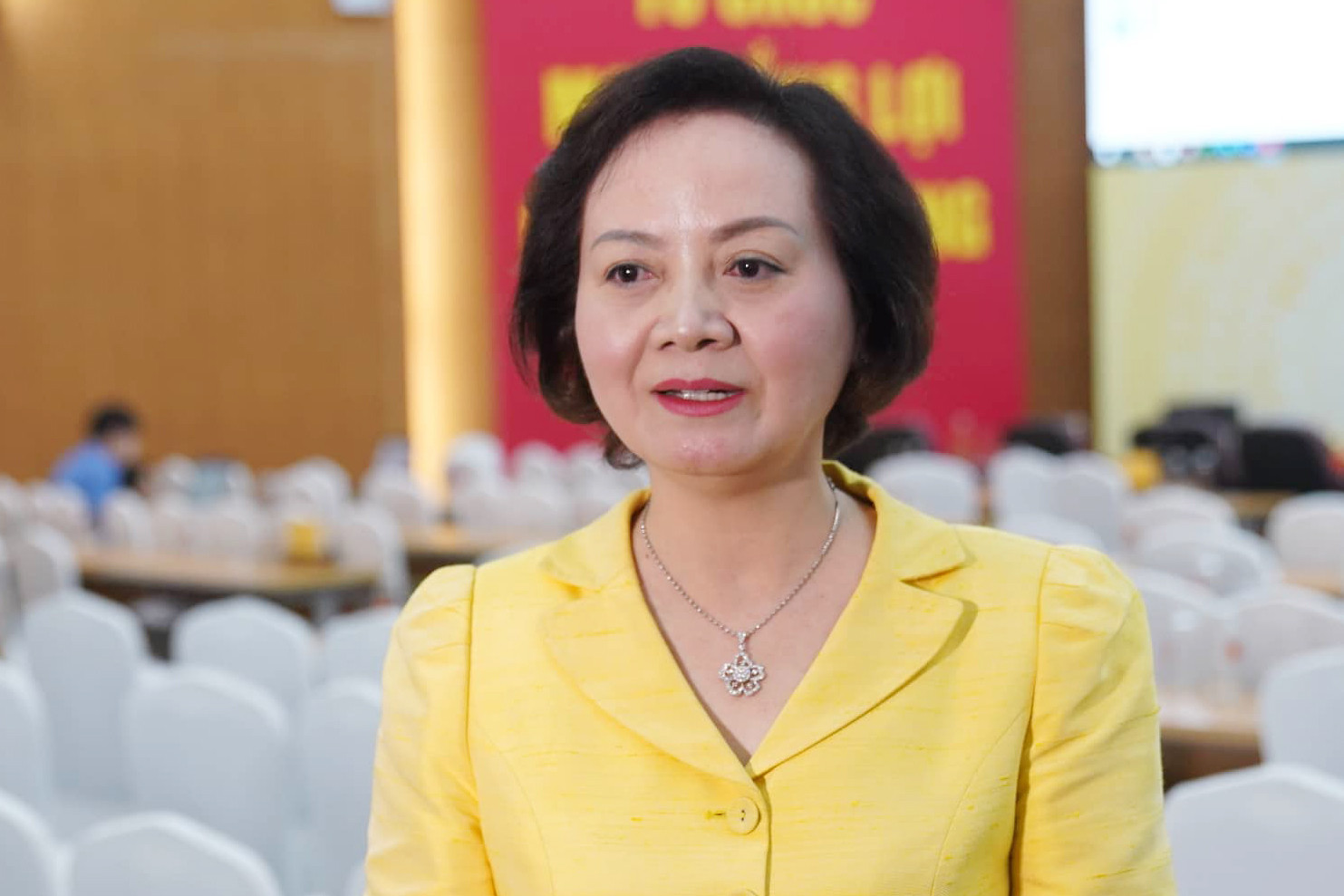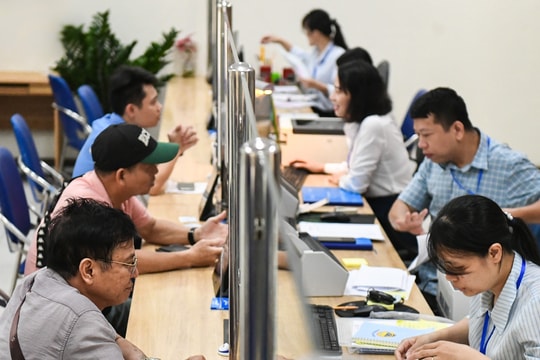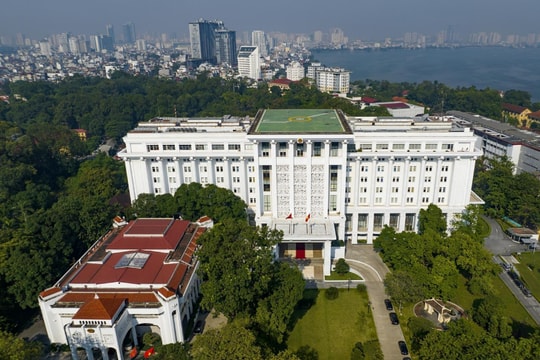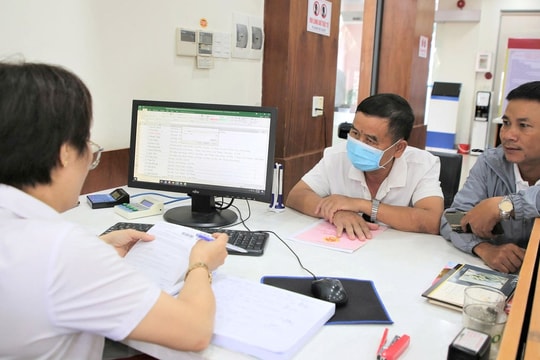Minister of Home Affairs Pham Thi Thanh Tra: Streamlining staff but must keep officials in the public sector
Minister of Home Affairs Pham Thi Thanh Tra shared many concerns about streamlining the payroll as well as building a team of professional and high-quality officials, civil servants and public employees in the coming time.
The draft Decree replacing Decree No. 108/2014, Decree No. 113/2018 and Decree No. 143/2020 of the Government on staff streamlining policy is being completed by the Ministry of Home Affairs in the final stages to be submitted to the Government for promulgation in the coming time.
Minister of Home Affairs Pham Thi Thanh Tra discussed a number of issues related to the implementation of the policy of streamlining staff in recent times.
 |
| Minister of Home Affairs Pham Thi Thanh Tra. Photo: TH |
First step in streamlining those who do not meet job requirements
In addition to the achievements, the implementation of the policy of streamlining the payroll in recent times also has some shortcomings, as in the draft Decree submission, the Ministry of Home Affairs mentioned that "there are opinions that the streamlining of payroll in recent times mainly reduces the number of retired people, quitters, and those who quit their jobs, only reducing the "elite" people (with enough capacity to participate in the private sector) without really being linked to the assessment and classification of work completion". Can the Minister elaborate on this situation??
According to the data on streamlining audits up to October 15, 2018 and the data on streamlining audits up to December 31, 2022 of the Ministry of Home Affairs, up to now, ministries, branches and localities have streamlined 79,178 staff (ministries, branches: 5,511 people; localities: 73,667 people).
Of which, the number of people who were downsized due to annual assessment not completing their tasks was the highest (52.712%); due to not meeting training standards (15.684%); redundant due to rearrangement of organization, personnel, administrative units (15.447%) and the lowest due to poor health (3.746%).
Thereby, it can be affirmed that the initial result of the policy of streamlining the payroll according to the Government's regulations is to remove from the team those who do not meet job requirements.
From there, restructure and improve the quality of the staff, civil servants and public employees, increase labor productivity, reduce costs and create a healthy working environment to improve the operational efficiency of agencies, organizations and units, save and reduce regular expenses, and reform salary policies.
However, as some opinions say, compared to the set goals and requirements, the results of streamlining the payroll in the 2015 - 2021 period only achieved the quantity target but were not really linked to restructuring and improving the quality of the staff, civil servants and public employees.
Specifically, among the total number of people who are downsizing, the highest proportion is the policy of early retirement (81.813%); the policy of immediate termination of employment (18%); the policy of transferring to work at organizations that do not receive regular salaries from the state budget (0.115%) and the lowest is the policy of termination of employment after vocational training (0.072%).
This is also a reality shown in the Ministry of Home Affairs' assessment report on the policy of streamlining the payroll. On that basis, the Ministry of Home Affairs has recommended and proposed to the Government policy solutions when drafting a Decree on the policy of streamlining the payroll to submit to the Government for promulgation in the coming time.
According to the assessment of the Ministry of Home Affairs, the goal of streamlining the payroll associated with improving the quality of the staff, civil servants and public employees is still both an urgent and long-term task to build a civil service that meets the requirements in the new situation?
That is true. Streamlining the payroll and improving the quality of the staff is a long-term goal. To achieve this, it is necessary to carry out many tasks and solutions synchronously and in accordance with each stage and specific context.
However, it can be seen that the "irreversible" spirit of the policy of streamlining the payroll has been highly unified in both perception and action by the Party, National Assembly, and Government.
The Central Committee and the Politburo have issued resolutions and conclusions on restructuring the apparatus and streamlining the payroll, setting out general and specific tasks, solutions, and goals for each stage.
Accordingly, the National Assembly and the Government have thoroughly grasped and focused on institutionalizing the Party's policies, perfecting mechanisms, policies and legal regulations. These include policies on streamlining the payroll associated with improving the quality of cadres, civil servants and public employees as a basis for ministries, branches and localities to implement.
Up to this point, we have achieved quite positive initial results. I believe that with the participation of the entire political system; at the same time promoting the sense of responsibility, determination to lead, direct the implementation, build a roadmap, plan, propose specific measures for implementation, in the coming time we will achieve the set goals.
Focus on improving income for cadres, civil servants and public employees
The draft Decree also acknowledges that there are cases where cadres, civil servants and public employees voluntarily want to retire or quit their jobs but are not subject to staff reduction, so they choose to work with low efficiency to be "assessed" as not completing their tasks to implement staff reduction. Why is there such a paradoxical situation, Minister?
Indeed, although there have been many positive changes in the evaluation of cadres, civil servants and public employees in recent times, it is still a "weak link, not reflecting the reality, not linked to specific results and products. There are many cases of sentimentality, deference, leniency or prejudice" as recognized in Resolution No. 26 of the 12th Central Committee.
Because the assessment and classification of cadres, civil servants and public employees are not true to reality, the implementation of the policy of streamlining the payroll in many places has not met the goal of removing from the team those who do not meet the standards, conditions and job requirements in order to improve the efficiency and quality of the team of cadres and civil servants.
There are even cases where people ask to not complete their tasks in order to implement the policy of streamlining the payroll. This not only affects the effectiveness of public service activities but also wastes the state budget.
Although these are just a few isolated cases, this requires the agency managing and employing civil servants and public employees to be responsible for evaluating, classifying and dealing with the right people for the right jobs. Only then can we accurately select the subjects that are subject to staff reduction to be removed from the system.
When evaluating, it must be linked to the results of the task and output products. If we evaluate based on feelings or qualitative indicators, streamlining the payroll will be more difficult.
So what solutions does the Ministry of Home Affairs have to overcome this situation, how to retain capable people in the public sector?
The Ministry of Home Affairs is also very concerned about the issue of retaining employees in the public sector. At the 4th session of the 15th National Assembly, the Ministry of Home Affairs and the Government also reported to the National Assembly on the situation of civil servants and public employees resigning and changing jobs (including the transfer of civil servants and public employees in the public sector to work in the private sector), and proposed immediate and long-term solutions.
At the same time, the Ministry also builds mechanisms and policies to attract, reward and promote cadres, civil servants and public employees to build high-quality human resources, meeting the requirements of improving the operational efficiency of state administrative organizations and public service units.
From the perspective of the management agency as well as the using agency, we must pay close attention to the existing staff, civil servants and public employees, directly having a salary policy to improve income.
The Ministry of Home Affairs has recently submitted to the Government a decree adjusting the basic salary from 1.49 to 1.8 million VND from July 1, 2023. This is to contribute to salary reform as well as create conditions to increase income for the team.
Along with that, we must promote financial autonomy to create additional revenue for public service units, thereby improving the income of cadres, civil servants and public employees.
In addition to the issue of income, the management and employing agencies must create a very good working environment for cadres, civil servants and public employees, with opportunities to contribute. When they contribute, we must be responsible for recognizing, motivating, rewarding and encouraging them in a timely manner.
In addition, there must also be a policy of planning, training, and fostering cadres early and from a distance to create a source of leadership for the future team of civil servants and managers.
In the coming time, the Government will implement a roadmap to reform salary policies according to the requirements of Resolution No. 27; issue policies to attract and promote talents in the public sector; perfect regulations on management, use, recruitment and appointment of cadres, civil servants and public employees, to meet the requirements of innovation and improve the quality of public service and civil servant activities, etc.
With these policies, I believe that we will build a team of professional cadres, civil servants and public employees, sufficient in quantity, with quality and reasonable structure, associated with perfecting a streamlined organization, operating effectively and efficiently.








